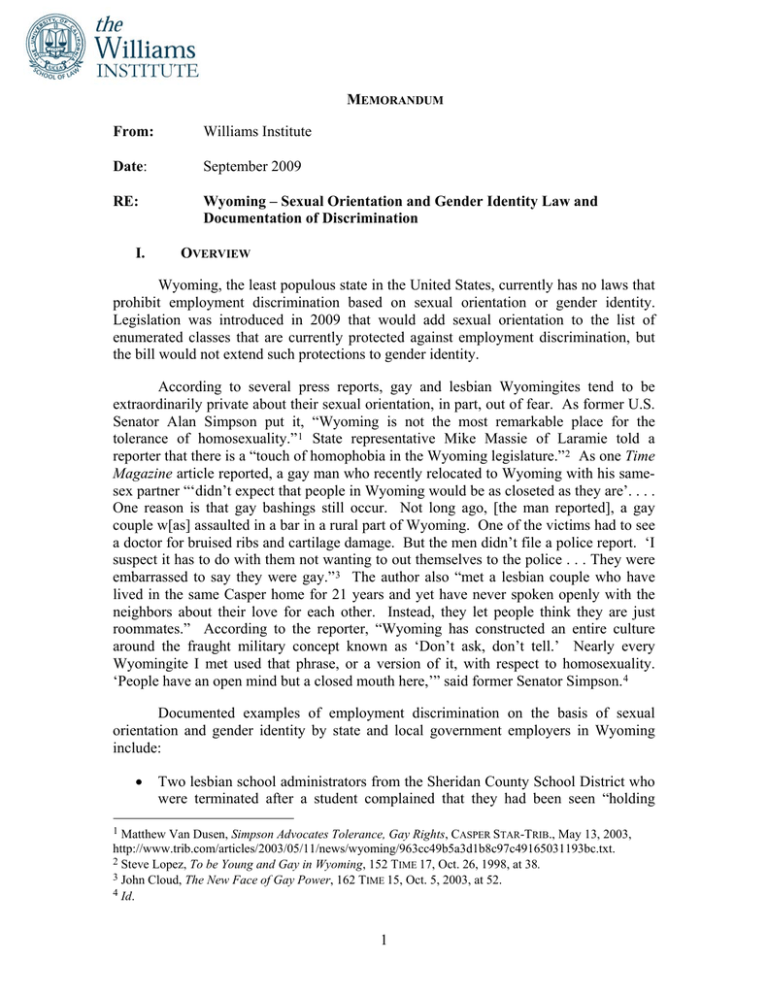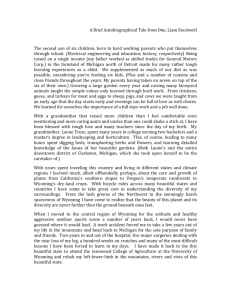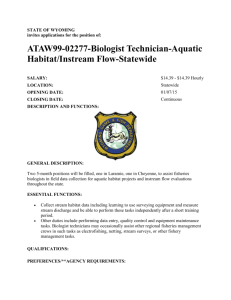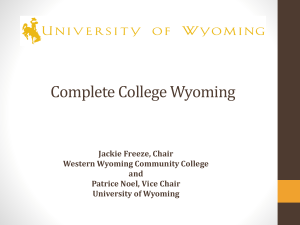
MEMORANDUM
From:
Williams Institute
Date:
September 2009
RE:
Wyoming – Sexual Orientation and Gender Identity Law and
Documentation of Discrimination
I.
OVERVIEW
Wyoming, the least populous state in the United States, currently has no laws that
prohibit employment discrimination based on sexual orientation or gender identity.
Legislation was introduced in 2009 that would add sexual orientation to the list of
enumerated classes that are currently protected against employment discrimination, but
the bill would not extend such protections to gender identity.
According to several press reports, gay and lesbian Wyomingites tend to be
extraordinarily private about their sexual orientation, in part, out of fear. As former U.S.
Senator Alan Simpson put it, “Wyoming is not the most remarkable place for the
tolerance of homosexuality.” 1 State representative Mike Massie of Laramie told a
reporter that there is a “touch of homophobia in the Wyoming legislature.” 2 As one Time
Magazine article reported, a gay man who recently relocated to Wyoming with his samesex partner “‘didn’t expect that people in Wyoming would be as closeted as they are’. . . .
One reason is that gay bashings still occur. Not long ago, [the man reported], a gay
couple w[as] assaulted in a bar in a rural part of Wyoming. One of the victims had to see
a doctor for bruised ribs and cartilage damage. But the men didn’t file a police report. ‘I
suspect it has to do with them not wanting to out themselves to the police . . . They were
embarrassed to say they were gay.” 3 The author also “met a lesbian couple who have
lived in the same Casper home for 21 years and yet have never spoken openly with the
neighbors about their love for each other. Instead, they let people think they are just
roommates.” According to the reporter, “Wyoming has constructed an entire culture
around the fraught military concept known as ‘Don’t ask, don’t tell.’ Nearly every
Wyomingite I met used that phrase, or a version of it, with respect to homosexuality.
‘People have an open mind but a closed mouth here,’” said former Senator Simpson. 4
Documented examples of employment discrimination on the basis of sexual
orientation and gender identity by state and local government employers in Wyoming
include:
•
Two lesbian school administrators from the Sheridan County School District who
were terminated after a student complained that they had been seen “holding
1 Matthew Van Dusen, Simpson Advocates Tolerance, Gay Rights, CASPER STAR-TRIB., May 13, 2003,
http://www.trib.com/articles/2003/05/11/news/wyoming/963cc49b5a3d1b8c97c49165031193bc.txt.
2 Steve Lopez, To be Young and Gay in Wyoming, 152 TIME 17, Oct. 26, 1998, at 38.
3 John Cloud, The New Face of Gay Power, 162 TIME 15, Oct. 5, 2003, at 52.
4 Id.
1
WYOMING
Williams Institute
Employment Discrimination Report
hands and walking into a Victoria’s Secret store.” 5 The superintendent then spoke
to the women individually about the allegations, angrily stating that he “knew all
about” them. The women were known to be a couple. The following year the
school underwent a reorganization and both of their positions were eliminated.
The women then applied to several job openings but were not selected for any of
them. They filed suit alleging violation of their equal protection rights on the basis
of sexual orientation. Following a trial on the merits, the jury found that the
school superintendent had unconstitutionally discriminated against the women,
awarding them $160,515 in damages. On appeal, the 10th Circuit held that the
superintendent was not the final policymaker for the district and, thus, the district
could not be liable for his actions. The Circuit court further concluded that in
2003 discrimination on the basis of sexual orientation was not clearly established
to be unconstitutional - as Bowers v. Hardwick 6 had not been overturned - and,
therefore, qualified immunity protected the superintendent from personal liability.
Milligan-Hitt v. Bd. of Tr. of Sheridan County Sch. Dist. No. 2, 523 F.3d 1219
(10th Cir. 2008).
•
An employee of the Wyoming Department of Family Services who alleged
gender discrimination based on comments made by a supervisor about her
perceived lesbianism. She originally framed her claim as one of discrimination
and retaliation under Title VII of the Civil Rights Act, alleging that she was
subjected to a hostile work environment because of her supervisors’
misapprehension that she was gay. She subsequently altered her claim to allege
that she was discriminated against “because her personal characteristics did not
conform to those that her supervisors believed to be appropriate for a woman in
society.” 7 The District Court granted summary judgment to defendants, holding
that “[s]exual orientation is conspicuously and intentionally absent from the list of
protected categories under Title VII,” and that “[r]ecasting allegations of
homophobia as ‘sex stereotyping’ does not of itself bring the action under the
purview of the Civil Rights Act.” 8 The Tenth Circuit affirmed the decision, and
the U.S. Supreme Court denied the employee’s writ of certiorari. 9 Brockman v.
Wyoming Dep’t of Family Serv., 478 U.S. 186 (1986).
Part II of this memo discusses state and local legislation, executive orders,
occupational licensing requirements, ordinances and polices involving employment
discrimination based on sexual orientation and gender identity, and attempts to enact such
laws and policies. Part III discusses case law, administrative complaints, and other
documented examples of employment discrimination by state and local governments
against LGBT people. Part IV discusses state laws and policies outside the employment
context.
5
Milligan-Hitt v. Bd. of Tr. of Sheridan County Sch. Dist. No. 2, 523 F.3d 1219 (10th Cir. 2008).
478 U.S. 186 (1986).
7 Brockman v. Wyoming, No. 00-cv-0087-B, slip. op. (D. Wyo. May 9, 2001).
8 Id.
9 Brockman v. Wyoming, 342 F.3d 1159, 1169 (10th Cir. 2003), cert. denied, 540 U.S. 1219 (2004).
6
2
WYOMING
Williams Institute
Employment Discrimination Report
II.
SEXUAL ORIENTATION AND GENDER IDENTITY EMPLOYMENT LAW
A.
State-Wide Employment Statutes
Currently, the state of Wyoming has not enacted laws to protect sexual orientation
and gender identity from employment discrimination. 10
B.
Attempts to Enact State Legislation
For the first time in January 2009, a joint group of state members of the House of
Representatives and Senators introduced a bill in the Wyoming state legislature that
would prohibit “discrimination based on sexual orientation” in employment. 11 The bill
would amend the current employment discrimination act to provide that “It is a
discriminatory or unfair employment practice: (i) For an employer to refuse to hire, to
discharge, to promote or demote, or to discriminate in matters of compensation or the
terms, conditions or privileges of employment against, a qualified disabled person or any
person otherwise qualified, because of age, sex, sexual orientation, race, creed, color,
national origin, ancestry or pregnancy.” 12 As of February 2, 2009, the bill had not been
considered in committee.
C.
Executive Orders, State Government Personnel Regulations, and
Attorney General Opinions
1.
Executive Orders
None. 13
2.
State Government Personnel Regulations
The Wyoming Department of Employment Labor Standards office oversees
issues related to state employees. The standards provide, in pertinent part, as follows:
10
See WYO. STAT. ANN. § 27-9-105 (2007)
(“It is a discriminatory or unfair employment practice: (i) For an employer to refuse to
hire, to discharge, to promote or demote, or to discriminate in matters of compensation or
the terms, conditions or privileges of employment against, a qualified disabled person or
any person otherwise qualified, because of age, sex, race, creed, color, national origin,
ancestry or pregnancy.”).
11
H.R. 203, 2009 Leg. Sess. (Wyo. 2009) (the bill would also prohibit discrimination on the basis of sexual
orientation in juror qualification, enjoyment of public accommodations and facilities, the right to life,
liberty, pursuit of happiness or the necessities of life, employment, participation on veterans’ commission
and education).
12 Id.
13 See, e.g., Wyoming State Library Executive Order Archive,
http://will.state.wy.us/sis/wydocs/execorders.html (last visited Sept. 3, 2009) (Wyoming Executive Order
2000-4 prohibits “discrimination or harassment related to an individual’s race, religion, color, sex, national
origin, age or disability” but does not include sexual orientation or gender identity.)
3
WYOMING
Williams Institute
Employment Discrimination Report
Any person claiming to be aggrieved by a discriminatory or unfair employment
practice may, personally or through his attorney, make, sign and file with the department
within six (6) months of the alleged violation a verified, written complaint in duplicate
which shall state the name and address of the person, employer, employment agency or
labor organization alleged to have committed the discriminatory or unfair employment
practice, and which shall set forth the particulars of the claim and contain other
information as shall be required by the department. The department shall investigate to
determine the validity of the charges and issue a determination thereupon. 14
3.
Attorney General Opinions
None. 15
D.
Local Legislation
None.
E.
Occupational Licensing Requirements
Although many professional commissioning boards may deny and revoke
occupational licenses for issues involving “moral turpitude” after providing the subject a
fair hearing, most of these statutes require a criminal conviction involving “moral
turpitude.” 16
14
WYO. STAT. ANN. § 27-9-106 (2005).
See, e.g., Wyoming Attorney General Bruce A Salzburg Archive of Formal Opinions,
http://attorneygeneral.state.wy.us/98forma2.htm (last visited Sept. 3, 2009).
16 See, e.g., WYO. STAT. ANN. § 33-30-212 (1997).
15
4
WYOMING
Williams Institute
Employment Discrimination Report
III.
DOCUMENTED EXAMPLES OF EMPLOYMENT DISCRIMINATION AGAINST
LGBT PEOPLE BY STATE AND LOCAL GOVERNMENTS
A.
Case Law
1.
State and Local Government Employees
Milligan-Hitt v. Bd. of Tr. of Sheridan County Sch. Dist. No. 2, 523 F.3d 1219
(10th Cir. 2008).
Two lesbians, who were known to be a couple, filed suit against the Sheridan
County school board and two high-ranking administrative officials under 42 U.S.C. §
1983 and the Fourteenth Amendment for allegedly violating the equal protection clause
by discriminatorily - on the basis of their sexual orientation - denying them positions to
which they applied at the school. 17 The factual predicate involves a 2002 incident in
which the women accompanied a school field trip from Wyoming to Montana. Upon
their return, the superintendent allegedly received “a complaint from parents who told
him that their daughter had seen the couple holding hands and walking into a Victoria’s
Secret store.” The superintendent then allegedly spoke to the women individually about
the allegations, angrily stating that he “knew all about” them, which made them feel as
though their jobs could be in jeopardy.
The following year the school underwent a reorganization that involved moving
and eliminating several administrative positions, including the ones that the plaintiffs
held. The women then applied to several job openings but were not selected for any of
them. The women claimed that various individuals, “through the superintendent’s office,
manipulated the hiring selection process . . . to ensure that [plaintiffs] were deprived of
future employment as administrators in the District, and they did this because of
[plaintiffs’] sexual orientation.”
Following a trial on the merits, the jury found that the school superintendent had
unconstitutionally discriminated against the women, awarding $160,515 in damages for
the superintendent’s conduct against the school district but not against the superintendent
himself. Both parties appealed, requiring the Tenth Circuit to decide the scope of
municipal liability and qualified immunity under § 1983. The three-judge panel reversed
the district court’s ruling, holding that the superintendent was not the final policymaker
for the district and, thus, the district could not be liable for his actions. The Circuit court
further concluded that in 2003 discrimination on the basis of sexual orientation was not
clearly established to be unconstitutional - as Bowers v. Hardwick 18 had not been
overturned - and, therefore, qualified immunity protected the superintendent from
personal liability.
17
18
523 F.3d 1219 (10th Cir. 2008).
478 U.S. 186 (1986).
5
WYOMING
Williams Institute
Employment Discrimination Report
Brockman v. Wyoming Dep’t of Family Serv., 478 U.S. 186 (1986).
A state employee alleging, inter alia, gender discrimination based on comments
made by a supervisor about the employee’s perceived lesbianism, which she denied. Ms.
Brockman originally framed her claim as one of discrimination and retaliation under Title
VII of the Civil Rights Act, alleging that she was subjected to a hostile work environment
because of her supervisors’ misapprehension that she was gay. She subsequently altered
her claim to allege that she was discriminated against “because her personal
characteristics did not conform to those that her supervisors believed to be appropriate for
a woman in society.” 19 The District Court granted summary judgment to defendants,
holding that “[s]exual orientation is conspicuously and intentionally absent from the list
of protected categories under Title VII,” and that “[r]ecasting allegations of homophobia
as ‘sex stereotyping’ does not of itself bring the action under the purview of the Civil
Rights Act.” 20 The Tenth Circuit affirmed the decision, and the U.S. Supreme Court
denied the employee’s writ of certiorari. 21
2.
Private Employees
None.
B.
Administrative Complaints
None.
C.
Other Documented Examples of Discrimination
None.
19
No. 00-cv-0087-B, slip. op. (D. Wyo. May 9, 2001).
Id.
21 342 F.3d 1159, 1169 (10th Cir. 2003), cert. denied, 540 U.S. 1219 (2004).
20
6
WYOMING
Williams Institute
Employment Discrimination Report
IV.
NON-EMPLOYMENT SEXUAL ORIENTATION AND GENDER IDENTITY
RELATED LAW
In addition to state employment law, the following areas of state law were
searched for other examples of employment-related discrimination against LGBT people
by state and local governments and indicia of animus against LGBT people by the state
government, state officials, and employees. As such, this section is not intended to be a
comprehensive overview of sexual orientation and gender identity law in these areas.
A.
Criminalization of Same-Sex Sexual Behavior
1.
Sodomy Laws
Wyoming repealed its sodomy law in 1977.
B.
Hate Crimes
Wyoming does not have a hate crimes law that extends to sexual orientation and
gender identity. Following the brutal murder of Matthew Shepard, however, see infra
Part IV, the Wyoming Legislature introduced several bills defining certain attacks
motivated by a victim’s identity, including sexual orientation, as “biased-motivated” or
hate crimes. 22 None of these legislative attempts has been successful.
One of the most startling and widely publicized hate crimes against LGBT people
in the United States involves the 1998 slaying of Matthew Shepard, an openly gay
University of Wyoming student. Shortly after midnight on October 7, 1998, in Laramie,
Wyoming, 21-year-old Matthew met two men in a bar who offered to give him a ride.
Subsequently, he was robbed, pistol whipped, tortured, tied to a fence in a rural area and
left to die. A bicyclist discovered Mr. Shepherd 18 hours later in a coma with a smashed
skull. Matthew never regained consciousness and was pronounced dead on October 12,
1998.
At trial, the two defendants attempted to use a “gay panic defense,” asserting that
they were driven to temporary insanity by alleged sexual advances by Matthew. The
defendants’ then-girlfriends testified that the two defendants intentionally targeted Mr.
Matthew because he was gay. The defendants were convicted of murder.
C.
Education
The University of Wyoming (“UW”), a publicly-funded state university with its
primary campus in Laramie, has an equal employment opportunity/diversity program.
Pursuant to this program, the University states that it “is committed to equal opportunities
for all persons in all facets of the University’s operations” and that:
22
H.R. 117, 1999 Leg. Sess. (Wyo. 1999); S. 84, 1999 Leg. Sess. (Wyo. 1999); H.R. 132, 1999 Leg. Sess.
(Wyo. 1999); S. 46, 2002 Leg. Sess. (Wyo. 2002).
7
WYOMING
Williams Institute
Employment Discrimination Report
“[t]he University’s policy has been, and will continue to be,
one of nondiscrimination, offering equal opportunity to all
employees and applicants for employment on the basis of
their demonstrated ability and competence without regard
to such matters as race, color, religion, sex, national origin,
disability, age, veteran status, sexual orientation or political
belief.” 23
The UW College of Law further prohibits “[a]ny employer that discriminates for
the purposes of hiring on the basis of race, color, religion, national origin, gender, sexual
orientation, marital status, age or disability” from using the facilities and services of the
law school’s Career Services Office. 24 (This policy was suspended with respect to the
military in response to the Solomon Amendment, which allows the Secretary of Defense
to deny federal grants to institutions of higher education if they prohibit or prevent
military recruitment on campus. 25 )
D.
Health Care
Under Wyoming law, a same-sex partner may make medical decisions for his or
her incapacitated partner pursuant to a Wyoming statute that permits “an adult who has
exhibited special care and concern for the patient, who is familiar with the patient’s
personal values, and who is reasonably available” to act as surrogate. 26 The statute,
however, only affords the same-sex partner surrogate decision-making rights if one of the
spouse, adult children, parents, adult siblings, grandparent or grandchildren are not
“eligible to act”. 27
An adult may designate his or her same-sex partner as having the authority to
make medical decisions on their behalf through a power of attorney. 28 The power must
be in writing and signed by the principal or by another person in the principal’s presence
and at the principal’s expressed direction. It should be either notarized or witnessed by
two individuals.
23
University of Wyoming, Laramie, Univ. Reg. 3, Rev. 2, June 12, 2007,
http://www.uwyo.edu/generalcounselsupport/UniRegs/3,%20rev%202.doc (last visited Sept. 3, 2009).
24 University of Wyoming College of Law Career Services Office 2007 Equal Opportunity Statement/NonDiscrimination Policy,
http://www.uwyo.edu/lawcsosupport/docs/EqualEmploymentOpportunityStatement.pdf (last visited Sept.
3, 2009).
25 See 10 U.S.C. § 983.
26 WYO. STAT. ANN. § 35-22-406 (2007).
27 Id.
28 Id. at § 35-22-403.
8
WYOMING
Williams Institute
Employment Discrimination Report
E.
Gender Identity
The state registrar of Wyoming will amend an individual’s birth certificate upon
receipt of a court order verifying that the individual has undergone sex-reassignment
surgery and that the individual’s name has been changed. 29
F.
Family
1.
Custody
According to the Human Rights Campaign (“HRC”), Wyoming courts typically
will not consider a parent’s sexual orientation in custody and visitation determinations
unless it is shown to adversely affect or harm the child(ren). 30 Research revealed only
one example of a court finding such an adverse impact. In that 1995 case, the Wyoming
Supreme Court concluded that a lesbian mother’s sexual expression and her “intensive
and unrelenting efforts to immerse the children in her alternative lifestyle, seemingly to
the point of indoctrination,” amounted to an adverse effect on the children. 31 The Court
affirmed a trial court’s imposition of severely limited visitation rights on the children’s
lesbian mother, including a restriction from the children seeing the mother’s same-sex
partner. Following the parents’ initial divorce, the mother initially won primary custody
of their children on the condition the she “disavow her lesbianism.” After the mother
began actively seeing another woman, she agreed to award custody of the children to
their father but retained liberal visitation rights. The custody and visitation rights
arrangement became contentious, however, because the father’s new wife espoused a
particularly stern religious view of homosexuality, which led to the couple seeking to
restrict the children’s visits with the lesbian mother.
In its opinion regarding the custody and visitation dispute, the Wyoming Supreme
Court particularly criticized the lesbian mother’s “ill-conceived ardor” in “insisting upon
fully informing the children as to her lifestyle,” including marching with the children in a
gay and lesbian pride parade, involving them in the same-sex couple’s commitment
ceremony, and allowing them to “snuggle” in bed with her and her partner. Although the
Court chastised both parents for using the children as pawns in their “lifestyle battle” it
nonetheless upheld the trial court’s decision to grant custody to the heterosexual father.
Even though the high court made numerous statements in its opinion regarding the
irrelevance of sexual orientation to the custody and visitation decision, the dissent
concludes: “The record quite clearly reveals that the father and [step-mother] worked
long and hard at alienating these children from their mother. They should have been held
in contempt for what they have done; instead, they are, despite the spin placed on it by
the majority, rewarded for their outrageous behavior.”
29
Wyo. Rules & Regs., Dep’t of Health, Vital Records Serv., Ch. 10 § 4(e) (2008).
Wyoming Adoption Laws, Hum. Rts. Campaign State Law Listings,
http://www.hrc.org/laws_and_elections/state_law_listing.asp?state=Wisconsin&btnG.x=13&btnG.y=8 (last
visited Sept. 3, 2009); see also WYO. STAT. ANN. § 20-2-201 (2003) (setting forth a non-exhaustive list of
factors that a court shall consider in determining the best interest of the child).
31 Hertzler v. Hertzler, 908 P.2d 946, 949 (Wyo. 1995).
30
9
WYOMING
Williams Institute
Employment Discrimination Report
2.
Adoption
Wyoming law permits “[a]ny adult person who has resided in [Wyoming] during
the sixty (60) days immediately preceding the filing of the petition for adoption and who
is determined by the court to be fit and competent to be a parent.” 32 Although there are
no specific statutory prohibitions on LGBT people with regard to adoption, it remains
unclear as to whether a court would deem such a person “unfit” or “incompetent” to be a
parent. Non-exhaustive research of electronic sources revealed no such examples.
G.
Recognition of Same-Sex Couples
Wyoming defines marriage as “a civil contract between a male and a female
person to which the consent of the parties capable of contracting is essential.” 33
H.
Wyoming Code of Judicial Conduct
The Wyoming Code of Judicial Conduct states that “A judge shall perform
judicial duties without bias or prejudice. A judge shall not, in the performance of judicial
duties, by words or conduct manifest bias or prejudice, including but not limited to bias
or prejudice based upon race, sex, religion, national origin, disability, age, sexual
orientation or socioeconomic status, and shall not permit staff, court officials and others
subject to the judge’s direction and control to do so.” 34 It further states that “A judge
shall require lawyers in proceedings before the judge to refrain from manifesting, by
words or conduct, bias or prejudice based upon race, sex, religion, national origin,
disability, age, sexual orientation or socioeconomic status, against parties, witnesses,
counsel or others. This Section . . . does not preclude legitimate advocacy when race, sex,
religion, national origin, disability, age, sexual orientation or socioeconomic status, or
other similar factors, are issues in the proceeding.” 35 It also notes that “Expressions of
bias or prejudice by a judge, even outside the judge’s judicial activities, may cast
reasonable doubt on the judge’s capacity to act impartially as a judge. Expressions which
may do so include jokes or other remarks demeaning individuals on the basis of their
race, sex, religion, national origin, disability, age, sexual orientation, or socioeconomic
status.” 36
32
WYO. STAT. ANN. § 1-22-103 (1986).
WYO. STAT. ANN. § 20-1-101 (1977).
34 WYO. CODE OF JUD. CONDUCT, Canon 3(B)(5).
35 WYO. CODE OF JUD. CONDUCT, Canon 3(B)(6).
36 WYO. CODE OF JUD. CONDUCT, Canon 4(A)(commentary).
33
10






